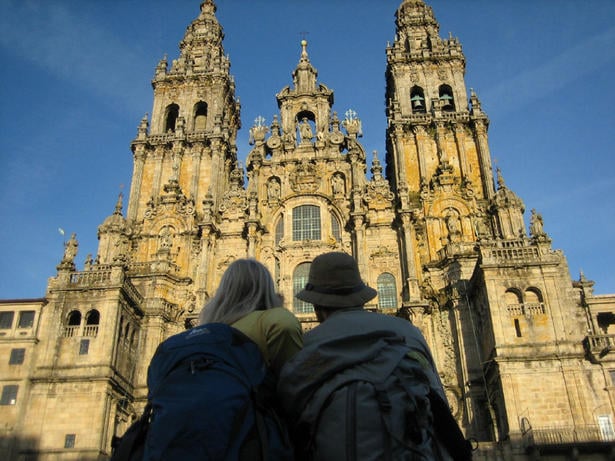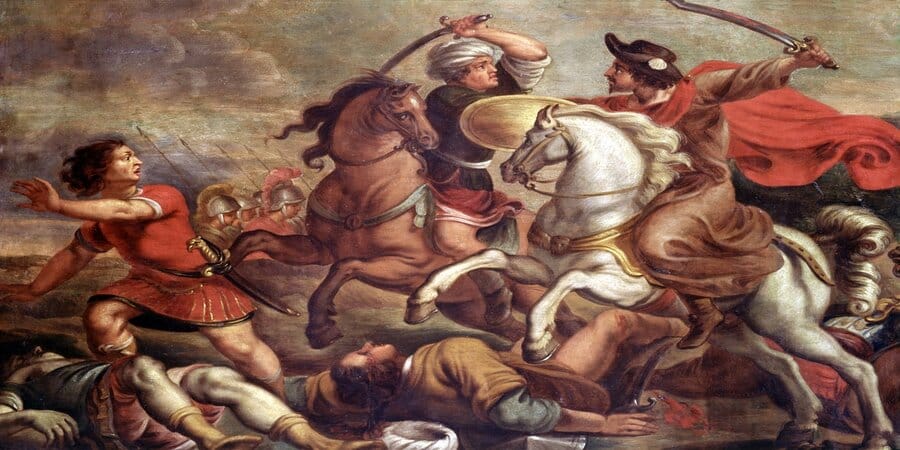Saint James, or James the Greater, is a significant figure in the Christian tradition. He is admired for his apostolic work and strong faith. Born in the first century AD, he was the son of Zebedee and Salome and the brother of John the Apostle. James worked as a Galilean fisherman, leading a simple life until a transformative event by the Sea of Galilee changed his path forever. This event marked the beginning of his extraordinary journey in the Christian faith. This is why we walk the Camino de Santiago to the Cathedral in Santiago de Compostela.
The Calling
One fateful day, James and his brother John mended their fishing nets when Jesus of Nazareth approached them. In a moment that would change their lives forever, Jesus invited them to follow him and become “fishers of men.” Without hesitation, the brothers left their nets, boat, and even their father to join Jesus in his ministry. This calling wasn’t just a career change but a spiritual mission that led James to distant lands. He spread Jesus’s message, helping to lay the foundation of Christianity.

Life as an Apostle
Once he became an apostle, James quickly emerged as one of the most zealous and courageous among Jesus’ closest followers. He was one of the select apostles present during significant events in Jesus’ life, such as the Transfiguration, where Jesus revealed his divine nature to his closest disciples. The Gospels often list James among the three closest apostles to Jesus—the others being Peter and his brother John. This trio witnessed and participated in pivotal moments in the story of Jesus.
His Missionary Work
James took on the role of a missionary after Jesus’s crucifixion and the subsequent rise of the Christian Church. Like many apostles, he embarked on journeys to spread the teachings of Jesus Christ. According to historical and ecclesiastical accounts, he travelled far and wide, even reaching the Iberian Peninsula (modern-day Spain and Portugal) to preach the Gospel. Though faced with adversity, his courage and determination never wavered.

Martyrdom
James’ fearless evangelism eventually led him to a tragic end. King Herod Agrippa I, eager to suppress the burgeoning Christian movement, ordered James’ arrest and subsequent execution, making him the first apostle to be martyred. His death, though heartbreaking, became a source of inspiration for future generations of Christians. He was willing to give up his life for his passionately upheld beliefs.
Legacy and Veneration
Saint James’ legacy continues to impact the world today. People honour him as the patron saint of Spain and believe his remains rest in Galicia. People believe James’s remains are interred in the Cathedral of Santiago de Compostela, a revered pilgrimage site. This site has become one of the most important pilgrimage destinations in the Christian world, attracting hundreds of thousands of pilgrims annually. Known as the Camino de Santiago or the Way of Saint James, this pilgrimage offers spiritual seekers a unique journey of faith, reflection, and community.
His scallop shell emblem is synonymous with pilgrimage and has become a symbol of safe travel and hospitality. Pilgrims often see the shell on trails and paths leading to Santiago de Compostela, reassuring them they’re on the right path.
Saint James is not just a historical figure but a spiritual beacon whose life and sacrifices continue to guide and inspire people in their faith journeys. His unwavering commitment to spreading the message of Jesus has left an indelible mark on Christian history, and his legacy as a devoted apostle and fearless missionary endures to this day.
Contact us for more information on Camino routes or to plan your Camino trip.

My very good friend walked the Camino and , in memory of my beloved wife Charlotte , placed a stone with her name inscribed at Ferro for me , a gesture I will forever remember and cherish .